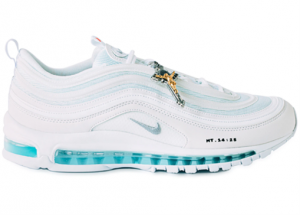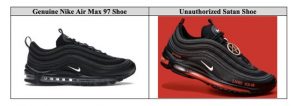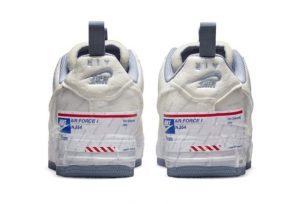MSCHF, a Brooklyn-based art collective, remade and sold 666 pairs of Air Max 97 model shoes. The “Satan shoes” had a drop of human blood in the sole, pentagrams at the laces, and a biblical quote embroidered on the side: “Luke 10:18”. Nike sued MSCHF for the use of their trademark and demanded compensation for the image damage suffered. However, the case did not set a precedent for the fashion industry, as the parties settled.
Who is MSCHF?
New York-based collective MSCHF is renowned for its controversy. In 2019, it presented a conceptual project entitled “This Foot Doesn’t Exist”, in which a chatbot sent internet users a pseudo-scientific treatise on the role of foot photos published on the internet and computer-generated foot images based on real photos. In the same year, MSCHF launched “Jesus shoes”, modified Nike Air Max 97 model shoes featuring, among other things, a drop of water from the Jordan River in the sole and a golden cross at the laces.

(Image 1: “Jesus shoes”)
Satan shoes
In March 2021, MSCHF remade the Nike Air Max 97 model shoes again, creating 666 pairs of “Satan shoes” that had a Bible quote embroidered on them, fluid with human blood in the airy sole system, and pentagrams at the laces. The shoes went on sale minutes after the launch at $1018 per pair. Among others, Miley Cyrus bought the unique shoes in a pre-sale, which she immediately reported online, increasing the popularity of the MSCHF project.
The release of “Satan shoes” coincided with the release of rapper Lil Nas X’s latest track titled. “Montero”. In the video, the rapper dressed in “Satan shoes” slides down a stripper pole from heaven to hell. The shoes and video refer to a passage from Luke’s gospel (10:18): “So he said to them: “I saw Satan falling from heaven like lightning”.

(Image 2: Comparison of the original Nike Air Max 97 model shoes and “Satan shoes”)
Reaction to “Satan shoes”
The MSCHF project sparked controversy and was widely criticised online. The rapper, who performed in the modified shoes, addressed the comments in a YouTube video published on 28 March titled. “Lil Nas X apologises for Satan shoes”. The video begins with a statement from the rapper holding the shoe, but instead of an apology, a snippet of the “Montero” music video appears, beginning with the words “Fuck it”.
On 29 March, Nike lawyers filed a lawsuit in federal court against MSCHF, accusing the collective of infringing and diluting a registered trademark, misleading the public as to the origin of “Satan shoes” and an act of unfair competition. Nike sought damages for the image damage suffered and a temporary ban on the distribution of the shoes.
In its lawsuit, Nike argued that it had not given MSCHF permission to promote and sell the remade shoes, so the creators of the design had infringed Nike’s trademark. MSCHF’s actions were further alleged to threaten the brand’s reputation, as according to Nike’s lawyers, “even sophisticated sneakerheads were confused” by the shoes, thinking that the company had authorised the launch of “Satan shoes”. As a result, consumers mistakenly believed that Nike endorsed Satanism and publicly called for a boycott of the brand.
To Nike’s satisfaction, the district judge issued a temporary injunction on April 1 prohibiting it from sending “Satan shoes” to MSCHF customers. However, this did not effectively restrict the distribution of the shoes – the “Satan shoes” were created in a limited edition of 666 pairs of shoes, and the entire batch, except one piece, was sold and shipped before the ban was issued.
MSCHF’s defence
During the trial, MSCHF defended itself by explaining that the modification of the Air Max 97 model was allowed because the “Satan shoes” are a protected artistic commentary on “extreme collaborative culture”. According to the collective’s lawyers, the modified shoes are art and criticism of Nike’s unreflective engagement in collaborations with anyone looking to gain popularity. MSCHF also argued that consumers can’t be in doubt about the origin of the shoes, as the “Satan shoes” are significantly different from the models sold by Nike. In addition, the artists pointed out the lack of consistency in Nike’s actions – the company did not raise objections to the “Jesus shoes” created in 2019, but their ideological opposite triggered a harsh reaction from the brand.
Settlement instead of precedent
A few days after the dispute was publicised by the international media, the parties reached a settlement under which MSCHF agreed to buy back all 665 pairs of ‘Satan shoes’ and previously issued ‘Jesus shoes’ at retail price. The owners of the shoes may or may not return the shoes. One suspects that a large proportion of consumers will choose the second option, as the value of the shoes has increased significantly as a result of the Nike lawsuit.
MSCHF’s lawyers say they are pleased with the settlement because the collective has achieved its artistic goal. The lawsuit further reinforced MSCHF’s message and highlighted the absurdity of the collaborative culture practiced by some brands and the pernicious intolerance of differing worldviews.
Had the parties not settled, the ‘Satan shoes’ case could have set a precedent for the fashion industry in which the court would have determined its attitude to the practice of ‘upcycling’ and selling modified designer products. However, the quiet conclusion of the dispute seems to have been beneficial for both parties. MSCHF avoided the possible legal consequences of trademark infringement, and Nike reduced the adverse publicity and potentially further damage to its reputation.
Additionally, Nike may have been willing to settle because it too uses third-party pieces in the design of new shoe models. This was recently noted by the US Postal Service, which objected to Nike’s planned Postal Service-inspired sneakers. An amicable settlement with MSCHF could be included in the lawsuit if the Postal Service decided to accuse Nike of infringing its mark

(Image 3: Postal Service-inspired Nike shoe design)


